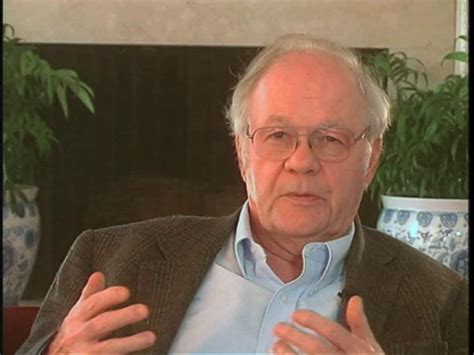A Quote by Joan D. Chittister
Blind obedience is itself an abuse of human morality. It is a misuse of the human soul in the name of religious commitment. It is a sin against individual conscience. It makes moral children of the adults from whom moral agency is required. It makes a vow, which is meant to require religious figures to listen always to the law of God, beholden first to the laws of very human organizations in the person of very human authorities. It is a law that isn't even working in the military and can never substitute for personal morality.
Quote Topics
Abuse
Adults
Against
Agency
Always
Authorities
Beholden
Blind
Blind Obedience
Children
Commitment
Conscience
Even
Figures
First
God
Human
Human Soul
Individual
Itself
Law
Laws
Listen
Makes
Meant
Military
Misuse
Moral
Morality
Name
Never
Obedience
Organizations
Person
Personal
Religious
Require
Required
Sin
Soul
Substitute
Very
Vow
Which
Whom
Working
Related Quotes
What little recognition the idea of obligation to the public obtains in modern morality, is derived from Greek and Roman sources, not from Christian; as, even in the morality of private life, whatever exists of magnanimity, high-mindeness, personal dignity, even the sense of honour, is derived from the purely human, not the religious part of our education, and never could have grown out of a standard of ethics in which the only worth, professedly recognized, is that of obedience.
It cannot be said too often that actions are good or bad in the light of consequences, and that a clear perception of consequences would control actions. That which increases the sum of human happiness is moral; and that which diminishes the sum of human happiness is immoral. . . . Blind, unreasoning obedience is the enemy of morality.
A growing body of social science research reveals that atheists, and non-religious people in general, are far from the unsavory beings many assume them to be. On basic questions of morality and human decency - issues such as governmental use of torture, the death penalty, punitive hitting of children, racism, sexism, homophobia, anti-Semitism, environmental degradation or human rights - the irreligious tend to be more ethical than their religious peers, particularly compared with those who describe themselves as very religious.
In war, in some sense, lies the very genius of law. It is law creative and active; it is the first principle of the law. What is human warfare but just this, - an effort to make the laws of God and nature take sides with one party. Men make an arbitrary code, and, because it is not right, they try to make it prevail by might. The moral law does not want any champion. Its asserters do not go to war. It was never infringed with impunity. It is inconsistent to decry war and maintain law, for if there were no need of war there would be no need of law.
The moral problem of abortion is of a pre religious nature because the genetic code is written in a person at the moment of conception. A human being is there. I separate the topic of abortion from any specifically religious notions. It is a scientific problem. Not to allow the further development of a being which already has all the genetic code of a human being is not ethical. The right to life is the first among human rights. To abort a child is to kill someone who cannot defend himself.
Lastly, our ancestors established their system of government on morality and religious sentiment. Moral habits, they believed, cannot safely be trusted on any other foundation than religious principle, nor any government be secure which is not supported by moral habits.... Whatever makes men good Christians, makes them good citizens.
It is terrible that we all die and lose everything we love; it is doubly terrible that so many human beings suffer needlessly while alive. That so much of this suffering can be directly attributed to religion—to religious hatreds, religious wars, religious delusions and religious diversions of scarce resources—is what makes atheism a moral and intellectual necessity.
The time has also come to recognize the painful truth that traditional Judeo-Christian moral values of pain and pleasure in human relationships have contributed substantially to child abuse and to the prevalence of physical violence in Western civilization.... The religious system upon which our culture is based holds that pain, suffering and deprivation are moral and necessary to save one's soul and make one a 'good person.' The crucifixion and scourging of Christ are examples.
There are three points of doctrine the belief of which forms the foundation of all morality. The first is the existence of God; the second is the immortality of the human soul; and the third is a future state of rewards and punishments. Suppose it possible for a man to disbelieve either of these three articles of faith and that man will have no conscience, he will have no other law than that of the tiger or the shark. The laws of man may bind him in chains or may put him to death, but they never can make him wise, virtuous, or happy.
























